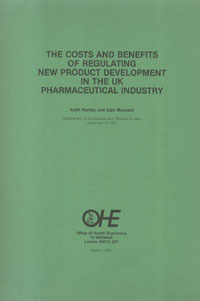Sign up to our newsletter Subscribe
Analysing Global Immunisation Expenditure

This is the second in an occasional series of Pharmaceutical Industry Papers to be published by OHE. The first concerned prices; this second paper is concerned, by contrast, with the costs of pharmaceutical innovation.
This study by Keith Hartley and Alan Maynard is…
This is the second in an occasional series of Pharmaceutical Industry Papers to be published by OHE. The first concerned prices; this second paper is concerned, by contrast, with the costs of pharmaceutical innovation.
This study by Keith Hartley and Alan Maynard is based on a survey which they conducted amongst major pharmaceutical companies in Britain during 1980. It clearly identifies costs arising from the 1968 Medicines Act, in terms of money, manpower and delays.
Significantly, since the survey was carried out in 1980 there has been some relaxation of the regulations controlling the testing and marketing of new medicines. In particular, the delays to clinical trials which Hartley and Maynard reported have been substantially reduced by a scheme of exemptions from Clinical Trial Certificates in suitable cases.
The conclusions of the two authors suggest that there may, however, be further scope for relaxation of regulations under the 1968 Act in order to strike an optimum balance between costs and benefits in relation to the safety of new medicines. Indeed Hartley and Maynard go so far as to discuss the possibility of a return to a voluntary scheme for the approval of new medicines, such as operated effectively under the Committee chaired by the late Sir Derrick Dunlop.
Whether or not such an option is a practical political possibility, the present survey is important in quantifying some of the costs associated with the operation of the 1968 Medicines Act in 1980. It is published by OHE as a contribution to the continuing discussion on the proper balance to be struck in relation to the safety of medicines. This debate is particularly relevant in Britain, which along with Germany, Switzerland and the United States is one of the four countries in the world whose pharmaceutical innovation contributes not only to the well-being of mankind but also the national economy. In 1980, the positive balance of trade in pharmaceuticals in Britain exceeded £500 million. Any measures which might help to maintain or expand this contribution to national wealth need to be carefully considered.
Costs and Benefits of Regulating New Product Development in the UK Pharmaceutical Industry
Hartley, K. and Maynard, A.
(1982) Costs and Benefits of Regulating New Product Development in the UK Pharmaceutical Industry. OHE Occasional Paper. Available from https://www.ohe.org/publications/costs-and-benefits-regulating-new-product-development-uk-pharmaceutical-industry/
